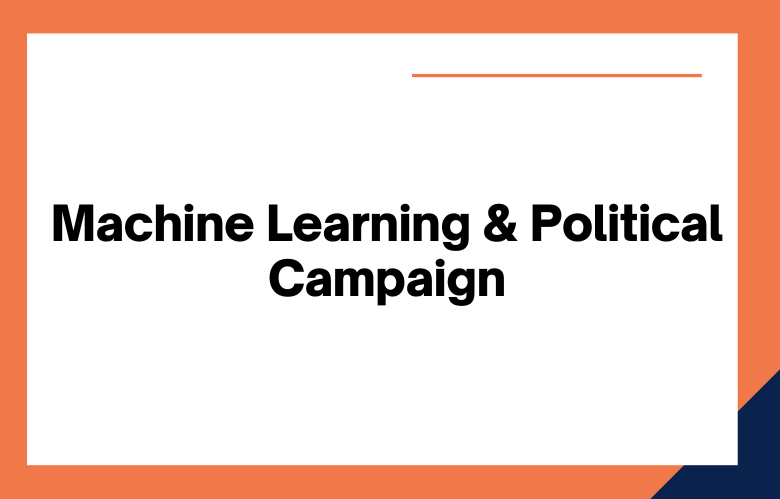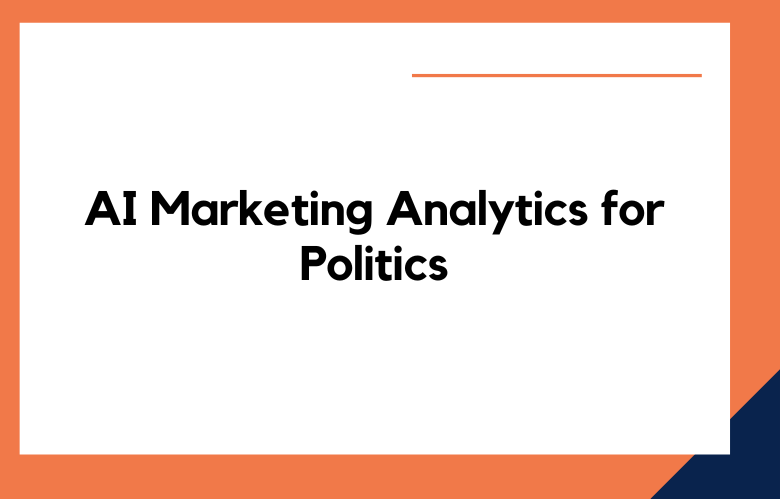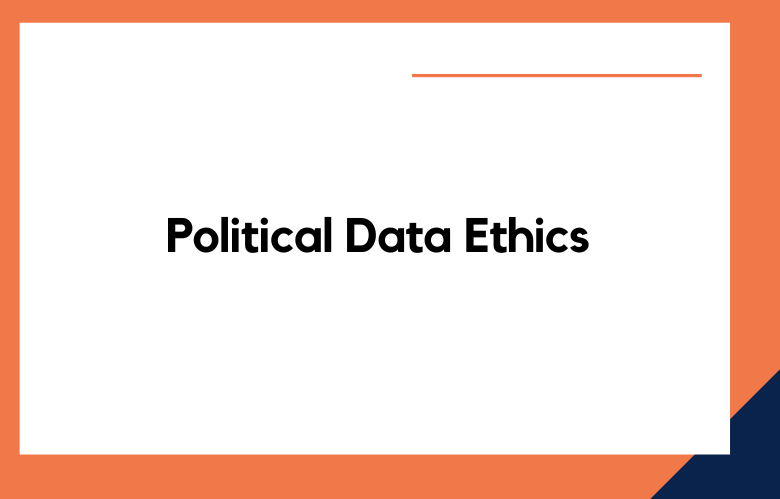Political campaigns increasingly rely on data and technology to target voters, fundraise, and get their message out. And as machine learning becomes more sophisticated, so do the opportunities for political campaigns to use it to their advantage. Here are three ways machine learning can enhance political campaign marketing.
How Machine Learning Can Enhance Political Campaign Marketing
Better Targeting of Voters
Machine learning can process large amounts of data—including voter data—to understand better who is likely to vote for a particular candidate and what issues are important to them.
This information can then be used to craft targeted messages and ads that resonate with those voters and persuade them to vote for the candidate. In the age of big data, machine learning is a powerful tool that can give campaigns a crucial edge in targeting voters.
Improved Fundraising Efforts
Machine learning can also improve fundraising efforts by identifying potential donors who are more likely to be interested in supporting a particular campaign. Using donor data from previous campaigns, machine learning algorithms can analyze patterns and predict which individuals are most likely to donate.
This information can then be used to focus fundraising efforts on those individuals, resulting in a higher return on investment for the campaign. In an era where every dollar counts, this is a significant benefit of using machine learning in political campaign marketing.
Enhanced Get-Out-the-Vote Operations
Finally, machine learning can improve Get-Out-the-Vote (GOTV) operations by identifying voters most likely to go to the polls on election day and tailoring GOTV messaging accordingly. Data from previous elections can be fed into a machine learning algorithm to identify critical patterns and predict which voters will most likely respond favorably to GOTV efforts.
Campaign staffers can then use this information to target their GOTV efforts in the days and weeks before election day, resulting in a higher overall turnout for the candidate.
Issue Identification
In any given election cycle, dozens of issues vie for attention. Identifying which resonates with voters and which falls flat can be the difference between winning and losing. With machine learning, you can automatically process large amounts of data to identify emerging trends and hot-button issues. This will allow you to fine-tune your message and ensure your campaign focuses on the correct points.
Voter Persuasion
Once you know what issues matter most to voters, you must message them to vote for your candidate. It can be challenging, as voters are often inundated with information from multiple sources and can quickly turn off by negative campaigning.
However, by using machine learning algorithms to analyze past election data, you can develop models that can predict how best to sway certain groups of voters. This will allow you to create targeted messages with a greater chance of persuasion—and ultimately translate into votes on election day.
Fundraising Insights
Fundraising is essential for any political campaign, but knowing where to focus your efforts can take time and effort. With machine learning, you can process enormous amounts of data—including donor history, demographic information, and past giving patterns—to find potential donors who are likely to give generously to your campaign. It will allow you to fundraise more effectively and raise the funds you need to run a successful political campaign.
Ways Machine Learning Can Enhance Political Campaign Marketing
Machine learning can enhance political campaign marketing by analyzing data to understand voter behavior better, improving ad targeting effectiveness, and predicting election outcomes.
By understanding voter behavior, campaigns can target potential supporters with more relevant ads. For example, if a campaign knows that a particular voter is more likely to respond to ads about healthcare, they can serve those ads to that voter specifically.
Ad targeting can also be improved through machine learning algorithms. These algorithms can help identify which types of ads are most likely to be effective for different groups of voters. It allows campaigns to focus their resources on the advertisements that are most likely to produce results.
Machine learning can also be used to predict the outcome of elections. Campaigns can use this capability to assess their chances of winning and make strategic decisions accordingly.
Machine learning algorithms can help campaigns better target their voters with customized messages. The algorithms can also help campaigns track voter engagement and predict which voters will most likely support the campaign. This information can help campaigns allocate resources more efficiently and increase their chances of winning.
Machine learning can be used to analyze data about voters to better target them with campaign ads. It can also track the effectiveness of campaigns and identify which strategies are most successful.
Ways machine learning can enhance political campaign marketing include identifying key demographics to target and personalizing content for individual voters.
Machine learning can help campaigns target their advertising and messaging better by understanding voters’ preferences and past behavior.
This can result in more relevant and effective campaigning, increasing turnout and support for a candidate.
Machine learning can help identify potential supporters and donors. Machine learning can help identify individuals or groups more likely to support a campaign by analyzing data on past supporters and donors. This information can then be used to target potential supporters with personalized content or incentives.
Machine learning can help create more accurate voter models. By analyzing data on past voting behavior, machine learning can help make more accurate predictions of how an individual voter will likely vote in the next election. This information can then target voters with tailored messages and campaign materials.
Machine learning can help improve campaign strategy. By analyzing past election results, machine learning can help identify which methods are most effective in winning votes. This information can then guide the allocation of resources and focus the campaign’s efforts on the areas where it is most likely to succeed.
Machine learning can enhance political campaign marketing by helping campaigns target their advertisements more effectively. Machine learning can analyze data about voters to identify which voters are most likely to support a particular candidate. This information can then be used to target campaign advertisements to those voters.
- Automatic content moderation to ensure posts are on-brand and appropriate
- Generating detailed reports on user engagement with campaign materials
- Automated sentiment analysis to determine positive or adverse reactions to content
- Identification of influential users and groups who could target outreach
- Suggesting new content ideas based on engagement data
- Machine learning can help identify individuals who are more likely to support a political campaign.
- It can also help identify critical issues important to voters and develop messaging around those issues that resonate with them.
- Machine learning can target potential supporters with personalized content and ads.
- A machine learning algorithm could be used to study past voting patterns to understand better how to appeal to specific demographics.
For example, suppose the algorithm found that a particular voting bloc is more likely to respond to targeted advertising based on their interests. In that case, campaign managers could allocate resources toward that type of advertising.
Machine learning can help identify and target potential voters more accurately and efficiently. It can also help campaigns better understand voter behavior and preferences, which can help inform strategic decisions about where to allocate resources.
Additionally, machine learning can create predictive models that identify individuals likely to vote and those likely to support a particular candidate. This information can improve overall campaign effectiveness and reach more people with the campaign message.
Machine learning can enhance political campaign marketing by identifying and targeting potential voters through predictive analytics. By analyzing data such as voting history, demographic information, and social media activity, campaigns can better understand which voters are most likely to support them and target them with personalized messages. Machine learning can also help campaigns optimize advertising spending by identifying the most effective ad placements and strategies.
- ML can help identify potential voters and predict their voting behavior.
- By analyzing data on past campaigns, voting patterns, and demographics, ML can help campaign managers target specific voters who are most likely to support their candidate.
- ML can also help identify areas where a candidate’s campaign is doing well or needs improvement. For example, it can help track a candidate’s online engagement and compare it to other candidates in the race.
- Machine learning can help identify potential voters and donors.
- It can also help target content and ads to those individuals.
- Machine learning can also track the effectiveness of different marketing strategies and adjust accordingly.
- Machine learning can enhance political campaign marketing in various ways, including providing targeted content to specific individuals, analyzing the sentiment of social media posts to identify support or opposition, and predicting voter turnout.
- Using machine learning algorithms, campaigns can target potential voters with relevant information based on their past behavior and preferences.
- Campaigns can also use machine learning to analyze the sentiment of social media posts to identify supporters or opponents of a candidate.
- Machine learning can be used to predict voter turnout for an election. It can help campaigns allocate resources more efficiently and improve their chances of winning.
- Use machine learning to target potential voters based on their interests and past voting behavior.
- Use machine learning algorithms to predict how a voter is likely to vote and target them accordingly.
- Machine learning is used to analyze social media sentiment data to understand public opinion on critical issues.
- Use machine learning to track engagement with campaign content online and adjust strategy accordingly.
- Machine learning can help identify critical demographics for a political campaign to target.
- Machine learning can help create targeted marketing content based on the interests of specific demographics.
- Machine learning can help track how people react to the campaign’s marketing content and adjust accordingly.
Machine learning can enhance political campaign marketing by helping campaigns target their advertising more effectively. Machine learning algorithms can analyze data about voters to identify patterns in their behavior and preferences. This information can create targeted ads more likely to appeal to specific voters.
Another way machine learning can be used in political campaigns is to improve the accuracy of polling data. By analyzing data from previous elections, machine learning algorithms can help pollsters better predict the outcome of future elections.
This information can help campaigns make more informed decisions about where to allocate their resources.
Machine learning could enhance political campaign marketing by automatically identifying and targeting potential voters through social media profiles. By analyzing a voter’s interests and activity on social media, campaigns could target them with specific ads and content that appeal to them. It would help campaigns maximize their reach and engagement with potential voters, increasing the likelihood of getting their votes.
Machine learning can enhance political campaign marketing by identifying voters likely to be persuaded by a particular message and targeting them with customized ads. It can also help determine which topics are most persuasive to different groups of voters and adjust campaign messaging accordingly.
Machine learning can help campaigns better target their voters by analyzing people’s voting history, demographics, and interests. It allows movements to create more effective messaging and outreach strategies. Machine learning can also help campaigns track voter engagement and predict which voters are most likely to turn out on election day.
Conclusion
As machine learning continues to evolve, so do the opportunities for political campaigns to use it to their advantage.
Machine learning is a powerful tool that any political campaign should consider incorporating into their marketing strategy this election season, from improved targeting of voters and enhanced fundraising efforts to improved Get-Out-The-Vote operations.
In today’s hyper-competitive political landscape, campaigns must use every tool at their disposal to win.
Machine learning is one such tool that can give campaigns a significant advantage.
By using machine learning algorithms, campaigns can more effectively process vast amounts of data and use it to their advantage in issue identification, voter persuasion, and fundraising efforts.
If you’re not already using machine learning in your political campaign marketing strategy, now is the time to start. Contact us for political marketing strategies.
Call: +91 9848321284
Email: [email protected]











